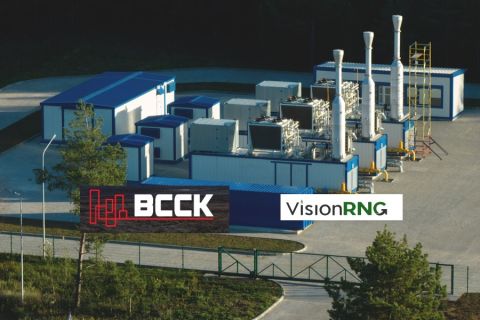
Bill Gates spot as the first major keynote in the program highlighted the conference’s dominant theme of carbon reduction technologies. (Source: Image of IHS Markit Vice-chair Daniel Yergin with Gates via CERAWeek by IHS Markit Ltd.)
Investor and philanthropist Bill Gates said at a virtual conference on March 1 that cheap green hydrogen would be a “huge deal” in helping the energy transition but added that its so-called green premium will factor into its use.
The green premium is the extra cost a consumer pays to buy a fuel or technology that emits fewer greenhouse gases. It is especially significant in sectors such as sustainable aviation fuel and cement, Gates said.
“The green premium is the metric that says are you on your way to success in 2050,” Gates said at IHS Markit’s CERAWeek.
This year’s CERAWeek oil and gas conference is increasingly focused on how to target cutting emissions to reach net-zero carbon by 2050. Gates spot as the first major keynote in the program highlighted the conference’s dominant theme of carbon reduction technologies.
RELATED:
From US Domination to Energy Transition: Two Years That Changed Oil
Gates said that while he was the biggest customer of aviation biofuels in the U.S., the lower-carbon fuels to power aircrafts costs three times as much than traditional petroleum-based jet fuel.
“It’ll be interesting to see how we can scale that up and can you get that green premium down from 300%, which for the aviation industry, their ticket prices would have to be a little higher,” Gates said.
In the energy transition, oil and gas companies can play a role and bring a particular skillset to help reduce carbon emissions, such as sequestering carbon and burying nuclear waste, Gates said.
Gates has spoken about tackling climate change before and has touched on the difficulties of lowering emissions from the manufacturing sector. The software-developer-turned-philanthropist has invested some $2 billion toward the development of clean technologies.
Recommended Reading
Solar Panel Tariff, AD/CVD Speculation No Concern for NextEra
2024-04-24 - NextEra Energy CEO John Ketchum addressed speculation regarding solar panel tariffs and antidumping and countervailing duties on its latest earnings call.
NextEra Energy Dials Up Solar as Power Demand Grows
2024-04-23 - NextEra’s renewable energy arm added about 2,765 megawatts to its backlog in first-quarter 2024, marking its second-best quarter for renewables — and the best for solar and storage origination.
BCCK, Vision RNG Enter Clean Energy Partnership
2024-04-23 - BCCK will deliver two of its NiTech Single Tower Nitrogen Rejection Units (NRU) and amine systems to Vision RNG’s landfill gas processing sites in Seneca and Perry counties, Ohio.
Clean Energy Begins Operations at South Dakota RNG Facility
2024-04-23 - Clean Energy Fuels’ $26 million South Dakota RNG facility will supply fuel to commercial users such as UPS and Amazon.
Romito: Net Zero’s Costly Consequences, and Industry’s ‘Silver Bullet’
2024-04-22 - Decarbonization is generally considered a reasonable goal when presented within the context of a trend, as opposed to a regulatory absolute.





